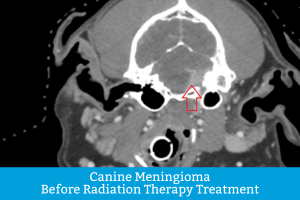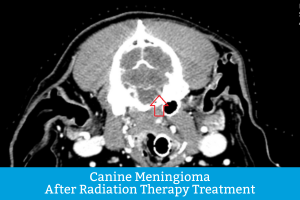Gliomas in Dogs
Gliomas, a type of brain tumor, are the second most common brain tumor in dogs and originate from the glial cells that support nerve cells in the brain. Although gliomas are often malignant, they can also be benign. In dogs, these brain tumors occur within the central nervous system and can manifest a wide range of symptoms and behaviors. In this article, we will delve into gliomas, examining their signs and symptoms, diagnostic methods, available treatment options, and the prognosis for dogs diagnosed with these brain tumors.
How To Make An Appointment
Reach out to us at (833) 467-2836, or streamline your request by selecting one of the options below:
Types of Gliomas in Dogs
Gliomas in dogs can be classified into a couple of types based on their location and histological features. These tumors can occur in various parts of the brain and spinal cord, each presenting unique challenges in diagnosis and treatment. By understanding the specific type and characteristics of the glioma, veterinarians can better tailor their approach to managing the condition and improving the dog’s quality of life.
- Astrocytomas: These tumors arise from star-shaped glial cells known as astrocytes. They can range from low-grade (slow-growing) to high-grade (fast-growing and more aggressive).
- Oligodendrogliomas: These tumors, which originate from oligodendrocytes, typically have a better prognosis than other gliomas. According to one report, they make up 28% of neuroectodermal tumors.
What Kind of Dogs are Susceptible to Glioma?
While any dog could develop a glioma, dogs from various brachycephalic breeds, such as English Bulldogs, Boston Terriers, and Boxers, often show the highest rates of brain tumors among domestic animals. Brachycephalic breeds are known for their distinctive short noses and flat faces, which unfortunately can also contribute to a range of health issues, including respiratory problems.
Furthermore, a comprehensive study involving 97 dogs found that Golden Retrievers also have a notable increased incidence of brain tumors, especially meningiomas (one type of brain tumor, but not a glioma). Golden Retrievers, beloved for their friendly and gentle nature, are unfortunately predisposed to several types of cancer, in addition to brain tumors, which requires vigilant health monitoring by their pet parents.
Signs & Symptoms of Gliomas in Dogs
The way gliomas manifest can significantly impact a dog’s neurological functions and overall well-being. The symptoms of gliomas in dogs can vary widely depending on the tumor’s location, size, and rate of growth – it’s these factors, rather than the type of tumor, that determines the effect on the brain and subsequent symptoms. Common signs include:
- Behavioral changes such as increased mental dullness, aggression or confusion. Dogs may seem disoriented or act out of character.
- Loss of coordination or balance, which may be evident through stumbling, difficulty walking, or frequent falls.
- Seizures, which can range from mild twitching to full-body convulsions, indicating severe neurological disruption.
- Visual disturbances, such as sudden blindness or difficulty tracking objects, affecting the dog’s ability to navigate their surroundings or a change in eye movement.
- Lethargy or depression, where the dog may appear unusually tired, withdrawn, or uninterested in activities they once enjoyed.
- Changes in appetite or weight, including a sudden decrease or increase in food consumption, which can lead to noticeable weight loss or gain.
- Circling, where the dog is involuntarily circling to one side (either the right or the left).
- Excessive panting, despite the ambient temperature.
It is crucial for pet parents to observe symptoms closely and consult a veterinarian promptly for further evaluation and appropriate treatment.
Diagnosing and Staging Gliomas in Dogs
Diagnosing canine gliomas generally requires a thorough process, including neurological examinations, imaging tests like MRI or CT scans, and occasionally a biopsy to closely analyze the tumor. These methods help to determine the type, location, and grade of the glioma, which are crucial for developing an effective treatment plan.
- Neurological Examination: To assess the nervous system and pinpoint areas affected by the tumor.
- Complete Physical Examination: To assess the dog’s entire body.
- Blood work: Such as a CBC, chemistry profile and a urinalysis to assess organ and bodily functions.
- Advanced Imaging: MRI or CT scans help in visualizing the size, location, and impact of the tumor on surrounding brain structures.
- 3-View Chest X-ray: To assess the pet prior to anesthesia and check for any metastases.
- Biopsy: Though uncommon, a biopsy may be performed to definitively diagnose the tumor type through a histopathological examination (examining tissue cells under a microscope).
- Staging of the tumor: Involves assessing whether cancer has spread and the extent of its impact. Staging is critical for proper treatment planning and could include an abdominal ultrasound, aspiration cytologies and/or other blood tests.
Treatment Options for Dogs with Gliomas
Treatment approaches for canine gliomas vary depending on the type and stage of the tumor, but generally include a multi-modal approach including:
Surgery: When feasible, surgical removal of the tumor. However, depending on where the tumor is located, surgery may not be a treatment option.
Radiation Therapy: Often employed post-surgery or as a standalone treatment to reduce and control tumor growth. Stereotactic radiation (SRS/SRT) can be a valuable tool particularly for inoperable brain tumors, treating the tumor with only 1-3 treatments.
Chemotherapy: Though not as common as radiation or surgery, chemotherapy can be used in conjunction with other treatments, and especially when very aggressive gliomas are suspected.
Palliative Care: Instead of treating the tumor, the primary objective of palliative care is managing symptoms and enhancing the dog’s quality of life.
Depending on the tumor size and location it often makes sense to utilize one or more of these treatments to ensure the complete eradication of cancer cells and to enhance the likelihood of success and reduce the chance of reoccurrence.
Prognosis for Dogs Diagnosed with Glioma
The prognosis for dogs with glioma depends significantly on the tumor’s type, size, location, and chosen treatment. Low-grade tumors, when detected early and managed effectively, often lead to a longer survival time compared to high-grade tumors. This is because low-grade tumors tend to grow more slowly and respond better to treatment options such as surgery, radiation therapy, or chemotherapy. By contrast, high-grade tumors, which are more aggressive and fast-growing, and those tumors that may have been detected rather late, usually have poorer outcomes. These tumors are often more resistant to conventional treatments and can spread to other parts of the brain or body, complicating the management of the disease. Therefore, early detection and a comprehensive treatment plan are crucial in improving the prognosis for dogs with glioma.
If your dog has recently been diagnosed with glioma or suspected glioma, feel free to get support through our Pet Advocate Team. A free public resource, PetCure Oncology’s Pet Advocates can answer questions and provide answers to your questions. You can reach them by calling 833-PET-HERO or 833-738-4376. Or, you can continue reading more general information about brain tumors in dogs.
If your dog is displaying any symptoms of cancer or has been diagnosed with cancer, sort below by cancer type or tumor location to learn more about the most common types of cancer in dogs and available treatment options. Click on the links for more specific information on treatment and real patient stories.
HEAD & NECK TUMORS IN DOGS
PELVIC CANAL TUMORS IN DOGS
- Anal Gland Adenocarcinomas in Dogs
- Transmissible Venereal Tumors (TVT) in Dogs
- Prostatic Tumors in Dogs
OTHER TUMORS IN DOGS
CARCINOMA/EPITHELIAL CANCER IN DOGS
- Adrenal Tumors in Dogs
- Anal Gland Tumors in Dogs
- Basal Cell Tumors in Dogs
- Biliary Cancer in Dogs
- Bladder, Prostate & Urethra (Transitional Cell) Cancer in Dogs
- Chemodectomas in Dogs
- Ear (Ceruminous Gland) Cancer in Dogs
- Liver (Hepatocellular) Cancer in Dogs
- Lung (Bronchogenic/Non-Small Cell) Cancer in Dogs
- Nasal (Sinonasal/Paranasal) Cancer in Dogs
- Neuroendocrine Carcinoma in Dogs
- Pancreatic Cancer in Dogs
- Perianal Cancer in Dogs
- Prostate (Prostatic) Cancer in Dogs
- Kidney (Renal) Cancer in Dogs
- Salivary Gland Tumors in Dogs
- Squamous Cell Carcinomas in Dogs
- Thymoma Cancer in Dogs
- Thyroid Cancer in Dogs
- Tonsillar Cancer in Dogs
ROUND CELL CANCER IN DOGS
SARCOMA/MESENCHYMAL CANCER IN DOGS
- Astrocytoma Cancer in Dogs
- Bone (Osteosarcoma) Cancer in Dogs
- Brain (Glioma) Cancer in Dogs
- Brain (Meningioma) Cancer in Dogs
- Chondrosarcoma Cancer in Dogs
- Choroid Plexus Papilloma in Dogs
- Ependymoma Cancer in Dogs
- Fibrosarcoma in Dogs
- Hemangiopericytoma in Dogs
- Histiocytic Sarcoma in Dogs
- Peripheral Nerve Sheath (Schwannoma) Tumors in Dogs
- Multilobular Osteochondroma in Dogs
- Oligodendroglioma in Dogs


